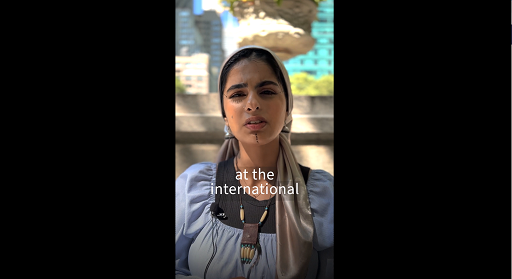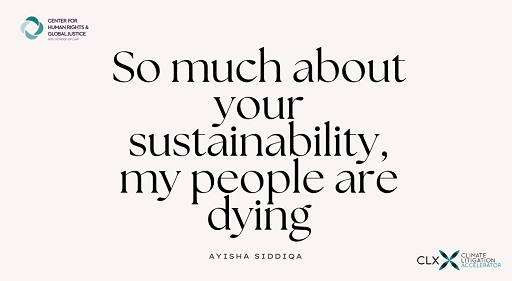5 Trouble with the COPs
You’ll now focus on the other end of the spectrum from individual behaviour change to look at the actions of the international organisations that should be guiding the world’s responses to the climate and ecological crisis. There are two international United Nations conferences that run annually in parallel. These are called ‘COPs’ (Conferences of the Parties). In 2022 the ecological COP, COP15 (the ‘Convention on Biological Diversity’), was hosted by Canada and chaired by China. It adopted four goals [Tip: hold Ctrl and click a link to open it in a new tab. (Hide tip)] , the key one being to protect 30% of Earth’s lands, oceans, coastal areas and inland waters. The better-known conferences are the COPs on climate change that focus on reducing carbon emissions, with goals like ‘net zero by 2030’ (or 2050 for the laggards) and the goal of no more than 1.5C degree rise in average temperature beyond which more catastrophic weather events will be triggered.
COP27, in 2022, was hosted for the first time by a nation of the global South (Egypt). It enlarged the ‘net zero’ focus with a historic shift that recognised the ‘loss and damage’ caused to vulnerable nations that played only a tiny part in carbon emissions. For the first time, a loss and damage policy was agreed which acknowledges that the people and countries least responsible for climate change are being affected first and most severely. The agreement was reached not long after devastating floods that affected one third of Pakistan, a vast area. Yet Pakistan, historically, is responsible for less than 1% of global greenhouse gas emissions. Millions lost homes, livestock, livelihoods and their futures. The effects will last for decades and the costs of repair are way beyond the financial means of Pakistan.
This example, and an equivalent one which is the long-term drought in the horn of Africa, galvanised the wealthy nations at COP27, but it would not have happened unless the vulnerable countries themselves had organised and formed a powerful interest group to press their case.
Activity 6 Climate justice
Here is Ayisha Siddiqa, a young Pakistani woman, at COP27, talking about the reason for her climate work, the fossil fuel industry’s malign influence on the COPs and how support for the most vulnerable communities is a way of protecting the planet.
Symone D. Sanders talks climate justice with Ayisha Siddiqa
- What was the most important thing you learned from this video?
- What do you think is relevant for Climate Psychology here? Consider her motivation for involvement (family history); her consequent identification with vulnerable communities; the root of the principle of climate justice in her experience of colonial injustice.
Discussion
In this video, Ayisha Siddiqa explains her personal reason for becoming a climate activist:
I became involved in climate work, not because I wanted to protect the environment, which I think is an absolutely necessary cause. I became involved because the fossil fuel industries have initiated wars in the country that I come from and killed, looted and completely destroyed environments for the reason of gaining control over vital resources like oil.
It followed that her climate activism centred on fossil fuel polluters, founding an organisation called ‘Polluters Out’, which, among other things, lobbies for a conflict-of-interest policy for the COPs. Listen to her explaining this in the following video:

Transcript
Pakistan was part of India when India was still a British colony (until 1947). The wealth of that vast and abundant country, appropriated by Britain, had fuelled the industrial revolution in the UK and made fortunes for the white colonisers (for example, find out about the history of the East India Company online). A similar story can be told throughout Asia and Africa and across the global south. These centuries-long colonial relations form the history of Pakistani people’s suffering with the exploitation of their natural resources, war and industrial pollution. Now they are the basis for their claims for reparations both more generally and in the form of loss and damage for climate-caused destruction.
Activity 7 The Earth has a memory?
Here is Ayisha Siddiqa again harnessing her anger about this history to deliver a powerful poetic message to COP27 about climate justice and the desecration of nature.

Transcript
In this video, Ayisha Siddiqa offers us a different idea of nature and the Earth from the Modern, separated one. She says ‘… the Earth has a memory and all of her beloveds that she keeps tucked in her landscapes have birthed guardians, they are sitting among me’.
Reflect on the following questions:
- What would a Climate Psychology look like that could live in concert with the idea that the Earth has a memory?
- What relation to this Earth is she feeling when she says that the guardians ‘are sitting among me’? (Think back to the section on ecopsychology.)
- What is the core of the critical time in history that she wants the audience to tell the rest of the world?
- Did you feel that Ayisha Siddiqa was addressing you and if so, as what? And how did it make you feel?
